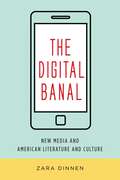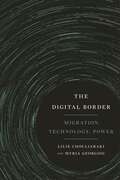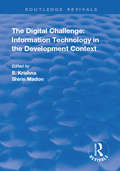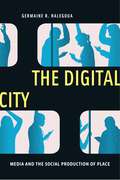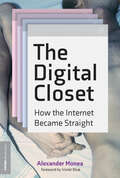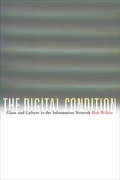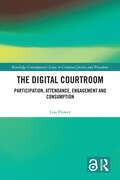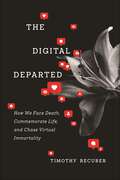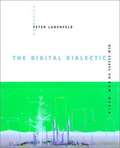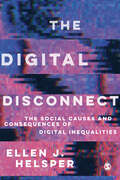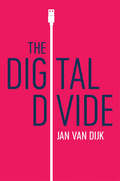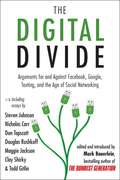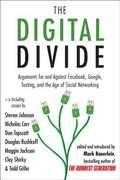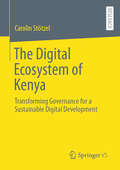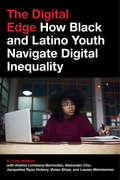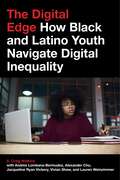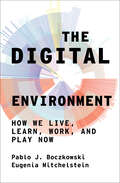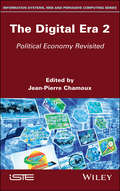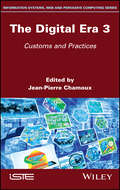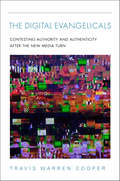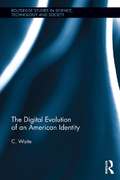- Table View
- List View
The Digital Banal: New Media and American Literature and Culture (Literature Now)
by Zara DinnenContemporary culture is haunted by its media. Yet in their ubiquity, digital media have become increasingly banal, making it harder for us to register their novelty or the scope of the social changes they have wrought. What do we learn about our media environment when we look closely at the ways novelists and filmmakers narrate and depict banal use of everyday technologies? How do we encounter our own media use in scenes of waiting for e-mail, watching eBay bids, programming as work, and worrying about numbers of social media likes, friends, and followers?Zara Dinnen analyzes a range of prominent contemporary novels, films, and artworks to contend that we live in the condition of the “digital banal,” not noticing the affective and political novelty of our relationship to digital media. Authors like Jennifer Egan, Dave Eggers, Sheila Heti, Jonathan Lethem, Gary Shteyngart, Colson Whitehead, Mark Amerika, Ellen Ullman, and Danica Novgorodoff and films such as The Social Network and Catfish critique and reveal the ways in which digital labor isolates the individual; how the work of programming has become an operation of power; and the continuation of the “Californian ideology,” which has folded the radical into the rote and the imaginary into the mundane. The works of these writers and artists, Dinnen argues, also offer ways of resisting the more troubling aspects of the effects of new technologies, as well as timely methods for seeing the digital banal as a politics of suppression. Bridging the gap between literary studies and media studies, The Digital Banal recovers the shrouded disturbances that can help us recognize and antagonize our media environment.
The Digital Black Atlantic (Debates in the Digital Humanities)
by Kelly Baker Josephs Roopika RisamExploring the intersections of digital humanities and African diaspora studies How can scholars use digital tools to better understand the African diaspora across time, space, and disciplines? And how can African diaspora studies inform the practices of digital humanities? These questions are at the heart of this timely collection of essays about the relationship between digital humanities and Black Atlantic studies, offering critical insights into race, migration, media, and scholarly knowledge production.The Digital Black Atlantic spans the African diaspora&’s range—from Africa to North America, Europe, and the Caribbean—while its essayists span academic fields—from history and literary studies to musicology, game studies, and library and information studies. This transnational and interdisciplinary breadth is complemented by essays that focus on specific sites and digital humanities projects throughout the Black Atlantic. Covering key debates, The Digital Black Atlantic asks theoretical and practical questions about the ways that researchers and teachers of the African diaspora negotiate digital methods to explore a broad range of cultural forms including social media, open access libraries, digital music production, and video games. The volume further highlights contributions of African diaspora studies to digital humanities, such as politics and representation, power and authorship, the ephemerality of memory, and the vestiges of colonialist ideologies. Grounded in contemporary theory and praxis, The Digital Black Atlantic puts the digital humanities into conversation with African diaspora studies in crucial ways that advance both. Contributors: Alexandrina Agloro, Arizona State U; Abdul Alkalimat; Suzan Alteri, U of Florida; Paul Barrett, U of Guelph; Sayan Bhattacharyya, Singapore U of Technology and Design; Agata Błoch, Institute of History of Polish Academy of Sciences; Michał Bojanowski, Kozminski U; Sonya Donaldson, New Jersey City U; Anne Donlon; Laurent Dubois, Duke U; Amy E. Earhart, Texas A&M U; Schuyler Esprit, U of the West Indies; Demival Vasques Filho, U of Auckland, New Zealand; David Kirkland Garner; Alex Gil, Columbia U; Kaiama L. Glover, Barnard College, Columbia U; D. Fox Harrell, MIT; Hélène Huet, U of Florida; Mary Caton Lingold, Virginia Commonwealth U; Angel David Nieves, San Diego State U; Danielle Olson, MIT; Tunde Opeibi (Ope-Davies), U of Lagos, Nigeria; Jamila Moore Pewu, California State U, Fullerton; Anne Rice, Lehman College, CUNY; Sercan Şengün, Northeastern U; Janneken Smucker, West Chester U; Laurie N.Taylor, U of Florida; Toniesha L. Taylor, Texas Southern U.
The Digital Border: Migration, Technology, Power (Critical Cultural Communication)
by Lilie Chouliaraki Myria GeorgiouHow do digital technologies shape the experiences and meanings of migration?As the numbers of people fleeing war, poverty, and environmental disaster reach unprecedented levels worldwide, states also step up their mechanisms of border control. In this, they rely on digital technologies, big data, artificial intelligence, social media platforms, and institutional journalism to manage not only the flow of people at crossing-points, but also the flow of stories and images of human mobility that circulate among their publics. What is the role of digital technologies is shaping migration today? How do digital infrastructures, platforms, and institutions control the flow of people at the border? And how do they also control the public narratives of migration as a “crisis”? Finally, how do migrants themselves use these same platforms to speak back and make themselves heard in the face of hardship and hostility? Taking their case studies from the biggest migration event of the twenty-first century in the West, the 2015 European migration “crisis” and its aftermath up to 2020, Lilie Chouliaraki and Myria Georgiou offer a holistic account of the digital border as an expansive assemblage of technological infrastructures (from surveillance cameras to smartphones) and media imaginaries (stories, images, social media posts) to tell the story of migration as it unfolds in Europe’s outer islands as much as its most vibrant cities. This is a story of exclusion, marginalization, and violence, but also of care, conviviality, and solidarity. Through it, the border emerges neither as strictly digital nor as totally controlling. Rather, the authors argue, the digital border is both digital and pre-digital; datafied and embodied; automated and self-reflexive; undercut by competing emotions, desires, and judgments; and traversed by fluid and fragile social relationships—relationships that entail both the despair of inhumanity and the promise of a better future.
The Digital Challenge: Information Technology in the Development Context (Routledge Revivals Ser.)
by Shirin Madon S. KrishnaThis title was first published in 2003. Information and communication technologies (ICTs) are increasingly being recognized as vital to the economic growth and global inclusion and participation of developing countries. This book brings together both academics and practitioners to provide a comprehensive and insightful overview of ICT and development around the world. It examines the role of IT in providing new economic and industrial opportunities, in increasing access to global information and communication, in assisting small cultural and ethnic groups to overcome disadvantages of physical distance and in catalysing initiatives towards democratic decentralization and empowerment of citizens. It also critically appraises major problems such as inappropriate focus and resource allocation, and of missed opportunities. By combining comparative case studies from Africa, South and East Asia, South America and Eastern Europe with theoretical analysis, this volume synthesizes a range of issues related to the evident tensions that exist for developing countries as they try to balance global and local priorities through the adoption and use of ICTs.
The Digital City: Media and the Social Production of Place (Critical Cultural Communication #4)
by Germaine R. HalegouaShows how digital media connects people to their lived environments Every day, millions of people turn to small handheld screens to search for their destinations and to seek recommendations for places to visit. They may share texts or images of themselves and these places en route or after their journey is complete. We don’t consciously reflect on these activities and probably don’t associate these practices with constructing a sense of place. Critics have argued that digital media alienates users from space and place, but this book argues that the exact opposite is true: that we habitually use digital technologies to re-embed ourselves within urban environments. The Digital City advocates for the need to rethink our everyday interactions with digital infrastructures, navigation technologies, and social media as we move through the world. Drawing on five case studies from global and mid-sized cities to illustrate the concept of “re-placeing,” Germaine R. Halegoua shows how different populations employ urban broadband networks, social and locative media platforms, digital navigation, smart cities, and creative placemaking initiatives to turn urban spaces into places with deep meanings and emotional attachments. Through timely narratives of everyday urban life, Halegoua argues that people use digital media to create a unique sense of place within rapidly changing urban environments and that a sense of place is integral to understanding contemporary relationships with digital media.
The Digital Closet: How the Internet Became Straight (Strong Ideas)
by Alexander MoneaAn exploration of how heteronormative bias is deeply embedded in the internet, hidden in algorithms, keywords, content moderation, and more.In The Digital Closet, Alexander Monea argues provocatively that the internet became straight by suppressing everything that is not, forcing LGBTQIA+ content into increasingly narrow channels—rendering it invisible through opaque algorithms, automated and human content moderation, warped keywords, and other strategies of digital overreach. Monea explains how the United States&’ thirty-year &“war on porn&” has brought about the over-regulation of sexual content, which, in turn, has resulted in the censorship of much nonpornographic content—including material on sex education and LGBTQIA+ activism. In this wide-ranging, enlightening account, Monea examines the cultural, technological, and political conditions that put LGBTQIA+ content into the closet.Monea looks at the anti-porn activism of the alt-right, Christian conservatives, and anti-porn feminists, who became strange bedfellows in the politics of pornography; investigates the coders, code, and moderators whose work serves to reify heteronormativity; and explores the collateral damage in the ongoing war on porn—the censorship of LGBTQ+ community resources, sex education materials, art, literature, and other content that engages with sexuality but would rarely be categorized as pornography by today&’s community standards. Finally, he examines the internet architectures responsible for the heteronormalization of porn: Google Safe Search and the data structures of tube sites and other porn platforms. Monea reveals the porn industry&’s deepest, darkest secret: porn is boring. Mainstream porn is stuck in a heteronormative filter bubble, limited to the same heteronormative tropes, tagged by the same heteronormative keywords. This heteronormativity is mirrored by the algorithms meant to filter pornographic content, increasingly filtering out all LGBTQIA+ content. Everyone suffers from this forced heteronormativity of the internet—suffering, Monea suggests, that could be alleviated by queering straightness and introducing feminism to dissipate the misogyny.
The Digital Condition: Class and Culture in the Information Network
by Robert WilkieThe acceleration in science, technology, communication, and production that began in the second half of the twentieth century— developments which make up the concept of the “digital”—has brought us to what might be the most contradictory moment in human history. The digital revolution has made it possible not only to imagine but to actually realize a world in which social inequality and poverty are vanquished. But instead these developments have led to an unprecedented level of accumulation of private profits. Rather than the end of social inequality we are witness to its global expansion.Recent cultural theory tends to focus on the intricate surface effects of the emerging digital realities, proposing that technological advances effect greater cultural freedom for all, ignoring the underpinning social context. But beneath the surfaces of digital culture are complex social and historical relations that can be understood only from the perspective of a class analysis which explains why the new realities of the “digital condition" are conditioned by the actualities of global class inequalities. It is no longer the case that "technology" can take on the appearance of a simple or neutral aspect of human society. It is time for a critique of the digital times.In The Digital Condition, Rob Wilkie advances a groundbreaking analysis of digital culture which argues that the digital geist—which has its genealogy in such concepts as the “body without organs,” “spectrality,” and “différance”—has obscured the implications of class difference with the phantom of a digital divide. Engaging the writings of Hardt and Negri, Poster, Deleuze and Guattari, Derrida, Haraway, Latour, and Castells, the literature and cinema of cyberpunk, and digital commodities like the iPod, Wilkie initiates a new direction within the field of digital cultural studies by foregrounding the continuing importance of class in shaping the contemporary.
The Digital Courtroom: Participation, Attendance, Engagement and Consumption (Routledge Contemporary Issues in Criminal Justice and Procedure)
by Lisa FlowerThe digitalisation of courtrooms brings both opportunities and challenges to the judicial process, shaping our understandings of trials and their participants in a myriad of, at times, unexpected ways, and transforming how we participate in, attend, engage with, and consume trials. While digital tools offer potential benefits, they can also impact core aspects of judicial integrity, such as the conduct of legal proceedings and participants’ experiences, as well as introducing additional layers of complexity – sometimes problematic – in how trials are portrayed in popular culture. By exploring these developments, the book highlights the importance of a thoughtful approach to digital integration – one that carefully considers its implications for procedural fairness, public trust, and the perceived legitimacy of the legal system. The author examines the social construction of courts in the digital age, arguing that digitalisation is not merely transforming the tools of justice but also redefining the very essence of the justice experience and reshaping our perceptions of trials and their participants. The work will be a valuable resource for scholars and students in the social sciences, law and all those interested in digitalisation and society.
The Digital Departed: How We Face Death, Commemorate Life, and Chase Virtual Immortality
by Timothy RecuberA fascinating exploration of the social meaning of digital deathFrom blogs written by terminally ill authors to online notes left by those considering suicide, technology has become a medium for the dead and the dying to cope with the anxiety of death. Services like artificial intelligence chatbots, mind-uploading, and postmortem blog posts offer individuals the ability to cultivate their legacies in a bid for digital immortality. The Digital Departed explores the posthumous internet world from the perspective of both the living and the dead.Timothy Recuber traces how communication beyond death evolved over time. Historically, the methods of mourning have been characterized by unequal access to power and privilege. However, the internet offers more agency to the dead, allowing users accessibility and creativity in curating how they want to be remembered.Based on hundreds of blog posts, suicide notes, Twitter hashtags, and videos, Recuber examines the ways we die online, and the digital texts we leave behind. Combining these data with interviews, surveys, analysis of news coverage, and a historical overview of the relationship between death and communication technology going back to pre-history, The Digital Departed explains what it means to live and die on the internet today. In this thought-provoking and uniquely troubling work, Recuber shows that although we might pass away, our digital souls live on, online, in a kind of purgatory of their own.
The Digital Dialectic: New Essays On New Media
by Peter LunenfeldComputers linked to networks have created the first broadly used systems that allow individuals to create, distribute, and receive audiovisual content with the same box. They challenge theorists of digital culture to develop interaction-based models to replace the more primitive models that allow only passive use. The Digital Dialectic is an interdisciplinary jam session about our visual and intellectual cultures as the computer recodes technologies, media, and art forms. Unlike purely academic texts on new media, the book includes contributions by scholars, artists, and entrepreneurs, who combine theoretical investigations with hands-on analysis of the possibilities (and limitations) of new technology. The key concept is the digital dialectic: a method to ground the insights of theory in the constraints of practice. The essays move beyond journalistic reportage and hype into serious but accessible discussion of new technologies, new media, and new cultural forms.
The Digital Difference
by W. Russell NeumanW. Russell Neuman examines how the transition from the industrial-era media of one-way publishing and broadcasting to the two-way digital era of online search and social media has affected the dynamics of public life. The issues range from propaganda studies and Big Brother to information overload and Internet network neutrality.
The Digital Disconnect: The Social Causes and Consequences of Digital Inequalities
by Ellen HelsperWith the increased digitisation of society comes an increased concern about who is left behind. From societal causes to the impact of everyday actions, The Digital Disconnect explores the relationship between digital and social inequalities, and the lived consequences of digitisation. Ellen Helsper goes beyond questions of digital divides and who is connected. She asks why and how social and digital inequalities are linked and shows the tangible outcomes of socio-digital inequalities in everyday lives. The book: Introduces the key theories and concepts needed to understand both ‘traditional’ and digital inequalities research. Investigates a range of socio-digital inequalities, from digital access and skills, to civic participation, social engagement, and everyday content creation and consumption. Brings research to life with a range of qualitative vignettes, drawing out the personal experiences that lay at the heart of global socio-digital inequalities. The Digital Disconnect is an expert exploration of contemporary theory, research and practice in socio-digital inequalities. It is also an urgent and impassioned call to broaden horizons, expand theoretical and methodological toolkits, and work collectively to help achieve a fairer digital future for all. Ellen J. Helsper is Professor of Digital Inequalities at the Department of Media and Communications at London School of Economics and Political Science.
The Digital Disconnect: The Social Causes and Consequences of Digital Inequalities
by Ellen HelsperWith the increased digitisation of society comes an increased concern about who is left behind. From societal causes to the impact of everyday actions, The Digital Disconnect explores the relationship between digital and social inequalities, and the lived consequences of digitisation. Ellen Helsper goes beyond questions of digital divides and who is connected. She asks why and how social and digital inequalities are linked and shows the tangible outcomes of socio-digital inequalities in everyday lives. The book: Introduces the key theories and concepts needed to understand both ‘traditional’ and digital inequalities research. Investigates a range of socio-digital inequalities, from digital access and skills, to civic participation, social engagement, and everyday content creation and consumption. Brings research to life with a range of qualitative vignettes, drawing out the personal experiences that lay at the heart of global socio-digital inequalities. The Digital Disconnect is an expert exploration of contemporary theory, research and practice in socio-digital inequalities. It is also an urgent and impassioned call to broaden horizons, expand theoretical and methodological toolkits, and work collectively to help achieve a fairer digital future for all. Ellen J. Helsper is Professor of Digital Inequalities at the Department of Media and Communications at London School of Economics and Political Science.
The Digital Divide
by Jan van DijkContrary to optimistic visions of a free internet for all, the problem of the ‘digital divide’ – the disparity between those with access to internet technology and those without – has persisted for close to twenty-five years.In this textbook, Jan van Dijk considers the state of digital inequality and what we can do to tackle it. Through an accessible framework based on empirical research, he explores the motivations and challenges of seeking access and the development of requisite digital skills. He addresses key questions such as: Does digital inequality reduce or reinforce existing, traditional inequalities? Does it create new, previously unknown social inequalities? While digital inequality affects all aspects of society and the problem is here to stay, Van Dijk outlines policies we can put in place to mitigate it.The Digital Divide is required reading for students and scholars of media, communication, sociology, and related disciplines, as well as for policymakers.
The Digital Divide
by Mark BauerleinThis definitive work on the perils and promise of the social-media revolution collects writings by today's best thinkers and cultural commentators, with an all-new introduction by Bauerlein. Twitter, Facebook, e-publishing, blogs, distance-learning and other social media raise some of the most divisive cultural questions of our time. Some see the technological breakthroughs we live with as hopeful and democratic new steps in education, information gathering, and human progress. But others are deeply concerned by the eroding of civility online, declining reading habits, withering attention spans, and the treacherous effects of 24/7 peer pressure on our young. With The Dumbest Generation, Mark Bauerlein emerged as the foremost voice against the development of an overwhelming digital social culture. But The Digital Divide doesn't take sides. Framing the discussion so that leading voices from across the spectrum, supporters and detractors alike, have the opportunity to weigh in on the profound issues raised by the new media-from questions of reading skills and attention span, to cyber-bullying and the digital playground- Bauerlein's new book takes the debate to a higher ground. The book includes essays by Steven Johnson, Nicholas Carr, Don Tapscott, Douglas Rushkoff, Maggie Jackson, Clay Shirky, Todd Gitlin, and many more. Though these pieces have been previously published, the organization of The Digital Dividegives them freshness and new relevancy, making them part of a single document readers can use to truly get a handle on online privacy, the perils of a plugged-in childhood, and other technology-related hot topics. Rather than dividing the book into "pro" and "con" sections, the essays are arranged by subject-"The Brain, the Senses," "Learning in and out of the Classroom," "Social and Personal Life," "The Millennials," "The Fate of Culture," and "The Human (and Political) Impact." Bauerlein incorporates a short headnote and a capsule bio about each contributor, as well as relevant contextual information about the source of the selection. Bauerlein also provides a new introduction that traces the development of the debate, from the initial Digital Age zeal, to a wave of skepticism, and to a third stage of reflection that wavers between criticism and endorsement. Enthusiasms for the Digital Age has cooled with the passage of time and the piling up of real-life examples that prove the risks of an online-focused culture. However, there is still much debate, comprising thousands of commentaries and hundreds of books, about how these technologies are rewriting our futures. Now, with this timely and definitive volume, readers can finally cut through the clamor, read the the very best writings from each side of The Digital Divide, and make more informed decisions about the presence and place of technology in their lives.
The Digital Divide
by Mark BauerleinThis definitive work on the perils and promise of the social- media revolution collects writings by today's best thinkers and cultural commentators, with an all-new introduction by Bauerlein. Twitter, Facebook, e-publishing, blogs, distance-learning and other social media raise some of the most divisive cultural questions of our time. Some see the technological breakthroughs we live with as hopeful and democratic new steps in education, information gathering, and human progress. But others are deeply concerned by the eroding of civility online, declining reading habits, withering attention spans, and the treacherous effects of 24/7 peer pressure on our young. With The Dumbest Generation, Mark Bauerlein emerged as the foremost voice against the development of an overwhelming digital social culture. But The Digital Divide doesn't take sides. Framing the discussion so that leading voices from across the spectrum, supporters and detractors alike, have the opportunity to weigh in on the profound issues raised by the new media-from questions of reading skills and attention span, to cyber-bullying and the digital playground- Bauerlein's new book takes the debate to a higher ground. The book includes essays by Steven Johnson, Nicholas Carr, Don Tapscott, Douglas Rushkoff, Maggie Jackson, Clay Shirky, Todd Gitlin, and many more. Though these pieces have been previously published, the organization of The Digital Divide gives them freshness and new relevancy, making them part of a single document readers can use to truly get a handle on online privacy, the perils of a plugged-in childhood, and other technology-related hot topics. Rather than dividing the book into "pro" and "con" sections, the essays are arranged by subject-"The Brain, the Senses," "Learning in and out of the Classroom," "Social and Personal Life," "The Millennials," "The Fate of Culture," and "The Human (and Political) Impact. " Bauerlein incorporates a short headnote and a capsule bio about each contributor, as well as relevant contextual information about the source of the selection. Bauerlein also provides a new introduction that traces the development of the debate, from the initial Digital Age zeal, to a wave of skepticism, and to a third stage of reflection that wavers between criticism and endorsement. Enthusiasms for the Digital Age has cooled with the passage of time and the piling up of real-life examples that prove the risks of an online-focused culture. However, there is still much debate, comprising thousands of commentaries and hundreds of books, about how these technologies are rewriting our futures. Now, with this timely and definitive volume, readers can finally cut through the clamor, read the the very best writings from each side of The Digital Divide, and make more informed decisions about the presence and place of technology in their lives. .
The Digital Economy
by Tim JordanBoasting trillion-dollar companies, the digital economy profits from our emotions, our relationships with each other, and the ways we interact with the world. In this timely book, Tim Jordan deftly explores the workings of the digital economy. He discusses the hype and significance surrounding its activities and practices in order to outline important concepts, theory, and policy questions. Through a variety of in-depth case studies, he examines the areas of search, social media, service providers, free economic activity, and digital gaming. Companies discussed include Google, Baidu, Uber, Bitcoin, Wikipedia, Fortnight, and World of Warcraft. Jordan argues that the digital economy is not concerned primarily with selling products, but relies instead on creating communities that can be read by software and algorithms. Profit is then extracted through targeted advertising, subscriptions, misleading 'purchases', and service relations. The Digital Economy is an important reference for students and scholars getting to grips with this enormous contemporary phenomenon.
The Digital Ecosystem of Kenya: Transforming Governance for a Sustainable Digital Development
by Carolin StötzelThe impact of the digital transformation on countries’ sustainable development is increasingly discussed in both theory and practice. This multidisciplinary book analyzes the implications of digital technologies and services for governance structures and government action, particularly in Kenya. Using the emerging concept of digital ecosystems, it uniquely combines digital development, sustainability, and governance research. This book identifies factors characterizing digital ecosystems and challenges to their sustainable digital development (e.g., lack of common understanding, power asymmetries and dependencies of multi-stakeholders). For addressing these challenges, it proposes coordination mechanisms including governance roles, governance formats such as multi-stakeholder partnerships, as well as alternative solutions such as coordinative digital platforms. These findings emphasize a deeper discussion around the digital transformation as a driving force and the global emphasis on partnerships if these are to foster and not impede sustainable development. About the author Carolin Stötzel holds a PhD in Political Science focusing on digital policy and international cooperation. She is an expert in digital transformation, governance, and sustainable development.
The Digital Edge: How Black and Latino Youth Navigate Digital Inequality (Connected Youth and Digital Futures #4)
by S. Craig Watkins Alexander ChoHow black and Latino youth learn, create, and collaborate onlineThe Digital Edge examines how the digital and social-media lives of low-income youth, especially youth of color, have evolved amidst rapid social and technological change. While notions of the digital divide between the “technology rich” and the “technology poor” have largely focused on access to new media technologies, the contours of the digital divide have grown increasingly complex. Analyzing data from a year‐long ethnographic study at Freeway High School, the authors investigate how the digital media ecologies and practices of black and Latino youth have adapted as a result of the wider diffusion of the internet all around us--in homes, at school, and in the palm of our hands. Their eager adoption of different technologies forge new possibilities for learning and creating that recognize the collective power of youth: peer networks, inventive uses of technology, and impassioned interests that are remaking the digital world.Relying on nearly three hundred in-depth interviews with students, teachers, and parents, and hundreds of hours of observation in technology classes and after school programs, The Digital Edge carefully documents some of the emergent challenges for creating a more equitable digital and educational future. Focusing on the complex interactions between race, class, gender, geography and social inequality, the book explores the educational perils and possibilities of the expansion of digital media into the lives and learning environments of low-income youth. Ultimately, the book addresses how schools can support the ability of students to develop the social, technological, and educational skills required to navigate twenty-first century life.
The Digital Edge: How Black and Latino Youth Navigate Digital Inequality (Connected Youth and Digital Futures #4)
by S. Craig Watkins Alexander ChoHow black and Latino youth learn, create, and collaborate onlineThe Digital Edge examines how the digital and social-media lives of low-income youth, especially youth of color, have evolved amidst rapid social and technological change. While notions of the digital divide between the “technology rich” and the “technology poor” have largely focused on access to new media technologies, the contours of the digital divide have grown increasingly complex. Analyzing data from a year‐long ethnographic study at Freeway High School, the authors investigate how the digital media ecologies and practices of black and Latino youth have adapted as a result of the wider diffusion of the internet all around us--in homes, at school, and in the palm of our hands. Their eager adoption of different technologies forge new possibilities for learning and creating that recognize the collective power of youth: peer networks, inventive uses of technology, and impassioned interests that are remaking the digital world.Relying on nearly three hundred in-depth interviews with students, teachers, and parents, and hundreds of hours of observation in technology classes and after school programs, The Digital Edge carefully documents some of the emergent challenges for creating a more equitable digital and educational future. Focusing on the complex interactions between race, class, gender, geography and social inequality, the book explores the educational perils and possibilities of the expansion of digital media into the lives and learning environments of low-income youth. Ultimately, the book addresses how schools can support the ability of students to develop the social, technological, and educational skills required to navigate twenty-first century life.
The Digital Environment: How We Live, Learn, Work, and Play Now
by Pablo J. Boczkowski Eugenia MitchelsteinUnderstanding digital technology in daily life: why we should think holistically in terms of a digital environment instead of discrete devices and apps.Increasingly we live through our personal screens; we work, play, socialize, and learn digitally. The shift to remote everything during the pandemic was another step in a decades-long march toward the digitization of everyday life made possible by innovations in media, information, and communication technology. In The Digital Environment, Pablo Boczkowski and Eugenia Mitchelstein offer a new way to understand the role of the digital in our daily lives, calling on us to turn our attention from our discrete devices and apps to the array of artifacts and practices that make up the digital environment that envelops every aspect of our social experience. Boczkowski and Mitchelstein explore a series of issues raised by the digital takeover of everyday life, drawing on interviews with a variety of experts. They show how existing inequities of gender, race, ethnicity, education, and class are baked into the design and deployment of technology, and describe emancipatory practices that counter this--including the use of Twitter as a platform for activism through such hashtags as #BlackLivesMatter and #MeToo. They discuss the digitization of parenting, schooling, and dating--noting, among other things, that today we can both begin and end relationships online. They describe how digital media shape our consumption of sports, entertainment, and news, and consider the dynamics of political campaigns, disinformation, and social activism. Finally, they report on developments in three areas that will be key to our digital future: data science, virtual reality, and space exploration.
The Digital Era 2: Political Economy Revisited
by Jean-Pierre ChamouxFor 200 years, industry mastered iron, fire, strength and energy. Today, electronics shape our everyday objects, integrating chips everywhere: computers, phones, keys, games, household appliances, etc. Data, software and calculation frame the conduct of men and the administration of things. Everything is translated into data: the figure is king. The second volume of this series describes how the digital economy transforms market relations and why this change puts political economy to the test.
The Digital Era 3: Customs and Practices
by Jean-Pierre ChamouxFor 200 years, industry mastered iron, fire, strength and energy. Today, electronics shape our everyday objects, integrating chips everywhere: computers, phones, keys, games, household appliances, etc. Data, software and calculation frame the conduct of men and the administration of things. Everything is translated into data: the figure is king. This third and last volume of the series examines the creative destruction induced by digital, modifying manners and customs, law, society and politics.
The Digital Evangelicals: Contesting Authority and Authenticity After the New Media Turn
by Travis Warren CooperWhen it comes to evangelical Christianity, the internet is both a refuge and a threat. It hosts Zoom prayer groups and pornographic videos, religious revolutions and silly cat videos. Platforms such as social media, podcasts, blogs, and digital Bibles all constitute new arenas for debate about social and religious boundaries, theological and ecclesial orthodoxy, and the internet's inherent danger and value.In The Digital Evangelicals, Travis Warren Cooperlocates evangelicalism as a media event rather than as a coherent religious tradition by focusing on the intertwined narratives of evangelical Christianity and emerging digital culture in the United States. He focuses on two dominant media traditions: media sincerity, immediate and direct interpersonal communication, and media promiscuity, communication with the primary goal of extending the Christian community regardless of physical distance. Cooper, whose work is informed by ethnographic fieldwork, traces these conflicting paradigms from the Protestant Reformation through the rise of the digital and argues that the tension is culminating in a crisis of evangelical authority. What counts as authentic interaction? Who has authority over the circulation of information?While many studies claim that technology influences religion, The Digital Evangelicals reveals how Protestant metaphors and discourses shaped the emergence of the internet and explores what this relationship with global new media means for evangelicalism.
The Digital Evolution of an American Identity (Routledge Studies in Science, Technology and Society)
by C. WaiteThe Digital Evolution of an American Identity details how the concept of American individualism is challenged by the digital revolution. As digital media alter our print-dominant culture, assumptions regarding the relationship of the individual to the larger community become increasingly problematic. Current arguments regarding freedom of speech and confusion about what is meant by privacy illustrate the nature of the challenge. C. Waite defines individualism as the ways in which the American culture traditionally strives to balance the rights of the individual against the needs of the group. Americans struggle to understand what it means to be responsible both for one’s self and for the welfare of others. They struggle with this not as an academic might, but in concrete and specific cases, often caught at cross-purposes with conflicting goods. This is a historic struggle, intrinsic to the very fabric of America's democratic society, as illustrated by its laws and customs. The American democracy has supported a view of the person as an autonomous individual. Yet that concept of American individualism no longer adequately captures the role of the self in the social world. The digital environment challenges that autonomy by creating new avenues for speech and new forms of social networks. Though the transition from a print-based culture to the digital domain entails a global revolution, American culture will suffer the consequences of that revolution more profoundly than other cultures because the concept of American individualism is foundational to its democratic way of life.
